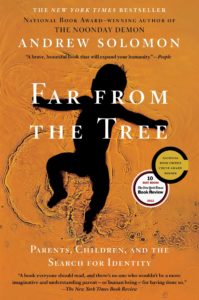Two very long books.
 1. 1Q84 by Haruki Murakami. I really enjoyed working my way through this novel. If you’re new to Murakami, I wouldn’t start with this one. It’s dauntingly long (almost 1,000 pages), and I could see some readers getting lost — if you aren’t ready for it — amid the strangeness and sadness that permeate many scenes in the book. But if you’re in the right headspace, the hyper detailed descriptions, the plot, and strange sci-fi “weather” cast over Tokyo make a memorable reading experience.
1. 1Q84 by Haruki Murakami. I really enjoyed working my way through this novel. If you’re new to Murakami, I wouldn’t start with this one. It’s dauntingly long (almost 1,000 pages), and I could see some readers getting lost — if you aren’t ready for it — amid the strangeness and sadness that permeate many scenes in the book. But if you’re in the right headspace, the hyper detailed descriptions, the plot, and strange sci-fi “weather” cast over Tokyo make a memorable reading experience.
Here’s just one quote that gives a sense of the vibe: “Once you pass a certain age, life is just a continuous process of losing one thing after another. One after another, things you value slip out of your hands the way a comb loses teeth. People you love fade away one after another. That sort of thing.”
2. Far From the Tree: Parents, Children, and the Search for Identity by Andrew Solomon
This is another brick of a book but of a very different sort: non-fiction, organized into focused chapters, each on some element of a non-ordinary life experience and how parents and families adapt. There are chapters on deafness, dwarfism, transgender, homosexuality, prodigies, autism, and others. If you’re a parent of a child who falls into any of these categories, it’s a a must-read. I’m not, but I still found myself learning a ton about the life experience of those with certain types of disabilities. In many chapters there’s a spotlight given to the push and pull of advocacy groups, politicians, educators, and others who try to standardize a point of view on whether parents should buy cochlear implants for their deaf child, for example, or a 5 year old boy who tells his parents he wants to become a girl.
 Solomon inclines to telling anecdotes over statistics, because “numbers imply trends and anecdotes imply chaos.” There’s a lot of messiness in the real family experiences profiled here. Internal debate. Changes of heart. I’m in awe at how Solomon shares stories about the families he spoke to. Genuine compassion and yet steel eyed honesty. He manages to assert his own opinion on topics where there’s true debate, but without simplifying the matter or selling short the diversity of views.
Solomon inclines to telling anecdotes over statistics, because “numbers imply trends and anecdotes imply chaos.” There’s a lot of messiness in the real family experiences profiled here. Internal debate. Changes of heart. I’m in awe at how Solomon shares stories about the families he spoke to. Genuine compassion and yet steel eyed honesty. He manages to assert his own opinion on topics where there’s true debate, but without simplifying the matter or selling short the diversity of views.